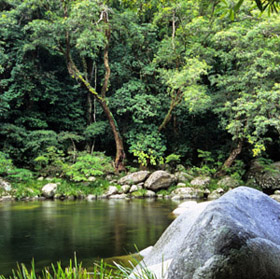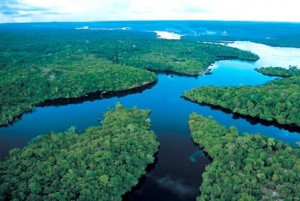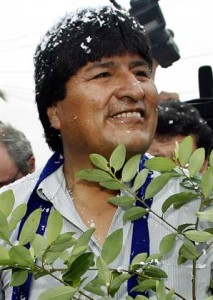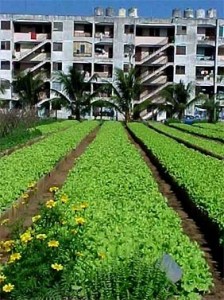1. COSTA RICA: The war against biodiversity is denounced
2. BRAZIL: Norway’s duplicitous role
3. CHILE: Mobilization against GM crops
4. BOLIVIA: GM crops are not welcome.
5. CUBA: Agroecology letter from Havana
1. COSTA RICA: War against Biodiversity Denounced
May 22 was International Biodiversity Day, but Costa Rican environmentalists saw no reason to celebrate. “How can we celebrate biodiversity when it is seriously threatened,” asked Nancy Hidalgo, president of the Coordinating Network for Biodiversity in Costa Rica (RCB). “The country has an open pit gold mining operation said to be in the public interest that will destroy hundreds of hectares of forest and an enormous degree of biodiversity. Although it could do so right now, the government won’t take action in the face of this threat. On the contrary, the government favors these projects. The recently signed moratorium on mining won’t solve the problem because it can’t be retroactively applied.”
Silvia Rodriguez, veteran defender of biodiversity and also a member of the Network adds that on the country’s beaches, foreign investors, with the approval of the government, are destroying coastlines and forests to put up hotels and luxury homes.
According to Eduardo Aguila of the Costa Rican chapter of Friends of the Earth (COECOCEIBA-AT), local ecology organizations fear that the new government of President Laura Chinchila will continue the nefarious policies of her predecessor Oscar Arias. “We believe that the trend to pursue the ‘War against Nature’ will continue down the same path and nature itself will drown in the commercialization of nature: if one can put a price on something to sell it, false solutions to climate change like carbon neutral will continue to be promoted. Carbon neutral is nothing more than a huge commercial strategy on the part of the government to support the interests of giant corporations.”
Criticism of Costa Rica’s environmental policy is nothing new. In March, 2009 representatives of civil society groups from various continents met in the country to share experiences, reflect and generate proposals on issues such as climate and forests. In a document drafted in the event, the Heredia Declaration, the participants declared that. “Costa Rica sells itself to the world as a ‘green’ country which defends its forests and its biodiversity, but we have verified that this is a false image which does not reflect the reality that the people and the environment of Costa Rica experience.”
We were able to confirm in an impressive manner the imposition of the agroexport model that is repeated in different ways and with different products over the length and breadth of the planet which has led us to the present environmental debacle,” said the Heredia Declaration. “This model of exporting raw materials, which includes monocrops, the intensive use of agrochemicals, the transport of products across thousands of kilometers for the consumption of an opulent north is one of the main causes of the present climate crisis.”
Source: http://www.redbiodiversidadcr.info/leer.php/4491349
For more information:
http://carmeloruiz.blogspot.com/search/label/Costa%20Rica
2. Brazil: Norway’s duplicitous role
The Norwegian government is one of the principal donors to the Amazon Fund, an institution created in 2008 by Brazilian President Luiz Ignacio “Lula” Da Silva and administered by the Brazilian Development Bank. It receives voluntary donations from governments, multilateral entities, businesses and non-governmental organizations for the purpose of combating the deforestation of the Amazon jungle and thus aiding in the fight against global warming.
But, according to the World Rainforest Movement (WRM), “In clear contradiction to this, the Norwegian government is investing in bauxite mining and the production of aluminum in the very Amazon jungle it claims to protect.” The Norwegian state company Norsk Hydro is prepared to take control of the bauxite mine Paragominas (http://www.miningtechnology.com/projects/paragominas/ ), one of the largest in the world, and to take over 91% of Alunorte (http://www.alunorte.net/), the world’s biggest aluminum refinery. Both facilities are located in the Brazilian state of Pará.
“The Norwegian government cannot ignore that the extraction of bauxite, its aluminum refining and its smelter for making metal from aluminum are supremely destructive processes which entail deforestation, contamination, displacement of local communities and grave impacts on livelihoods and health,” the WRM points out. “At the same time, some of the processes – particularly deforestation – contribute considerably to the increase in global warming.”
The NGO indicates that aluminum smelting is a process which requires enormous quantities of electricity which constitute between 20% and 40% of operating costs. And in the Amazon, the only way to obtain so much energy is by means of giant hydroelectric dams. “It is not at all surprising that the Brazilian government has recently approved the construction of the controversial Belo Monte dam, whose objective is to feed industrial processes such as that of aluminum along with the required low-cost energy.
“Some 20,000 people in the districts of Altamira, Vitória de Xingu and Brasil Novo will have to abandon their land and be relocated, charged the organization Save the Jungle. “The damage to fish and the fluvial exchange will add to the incalculable environmental damage. Emissions of methane, a gas with a very strong greenhouse effect, are another grave problem, as is the increase in illnesses such as malaria and yellow fever. Because similar dams have already been constructed in the past in Brazil, the disastrous effects on the environment, climate and human beings are very well known.”
In May, 2010, WRM challenged Norway: “If the Norwegian government is sincere about wanting to preserve the Amazon and avoid the emissions caused by deforestation, it can’t undertake a project for producing aluminum on a grand scale which is developed at the expense of the Amazon and the peoples which depend on the forest. If this isn’t the case, it ought to clearly state that it is giving priority to profits and business over the health of the Amazon.”
Sources:
BBC Mundo. “Brasil lanza el ‘Fondo Amazonia'” August 2 2008. http://news.bbc.co.uk/hi/spanish/latin_america/newsid_7538000/7538475.stm
World Rainforest Movement “Brasil: El doble papel de Noruega”, May 2010 bulletin. http://www.wrm.org.uy/inicio.html
Salva la Selva, “Mega-represa en Brasil: ¡No queremos Belo Monte!” March 19 2010. http://www.salvalaselva.org/protestaktion.php?id=550
3. CHILE: Mobilization against GM crops
Dozens of Chilean civil society organizations are standing together in the fight against a so-called “Plant Breeders’ Rights” Senate bill. According to the protest campaign, the project “implies that the genetic contamination of vegetable species, would put in danger native seeds, would have negative impacts on consumer health, would threaten all agricultural exports, organic agricultural production, and also the competitiveness of exports in this sector. Furthermore, it would dramatically increase the dependence of farmers on transnational agrochemical corporations, and would raise the price of food.”
“We are talking about a direct attack on food production which was, until now, in the hands of campesinos and medium-sized producers and who will find themselves subject to greater costs and greater controls,” said an open letter signed by many groups including the National Committee For the Defense of Flora and Fauna (CODEFF) and the National Association of Rural and Indigenous Women (ANAMURI).
“(Genetically modified) crops are harmful for flora and fauna, the soil, and human health, the open letter affirmed. “Until now no biotechnology company has presented studies which prove the safety of (GM foods) in human and animal health. On the contrary, there is an increasing number of studies that show there is a significant threat to health and the environment, which generates great uncertainty and more precautionary measures around the world. But the authorities do not heed these reasons, nor do they seem interested in protecting producers’ organic and traditional crops, despite their internationally recognized quality.”
The open letter’s signatories warned that the bill in question will not make Chilean agricultural exports more competitive, but rather the contrary. “It could mark the closing of markets which demand non-GM products and products free of pesticide residue, that is to say food products that are safe and healthy, that are worthy of a country which is trying to turn itself into a food producing power and where consumers are also increasingly conscious of their rights.”
For more information:
http://www.thepetitionsite.com/1/noprivaticenlassemillas
http://bioseguridad.blogspot.com/search/label/Chile
4. BOLIVIA: GM Crops are not Welcome
Bolivian president Evo Morales decreed a five-year transition period in which to eliminate genetically modified (GM) crops from the national territory, as well as a process for rescuing local seeds in order to promote food sovereignty.
“The process of recovering food sovereignty in Bolivia has had to overcome various obstacles,” commented Radio Mundo Real. “In addition to the problem of the Brazilian latifundistas who appropriated vast areas of land without pause for decades, the penetration of GM seeds is a true ‘Trojan Horse’ in the popular project of Evo Morales and Bolivian campesino organizations.”
“Obviously, we cannot support the assertions of the giant agribusiness consortia which see hybrid and GM seeds as the solution for the problem of world hunger,” said Oscar Mendieta-Chávez, advisor in the Rural Development and Lands Ministry.
“These GM seeds are not the product of nature or of God, and therefore rather than being of benefit to the campesino farmer, they risk contaminating wild, local genetic resources as well as consumers,” the functionary added.
Source:
Radio Mundo Real. “Ultimátum: En el plazo de un lustro Bolivia estará libre de transgénicos”. May 31 2010. http://www.radiomundoreal.fm/Ultimatum
For more information:
http://bioseguridad.blogspot.com/search/label/Bolivia
5. CUBA: Agroecology Letter from Havana
Around 40 people participated in the VIII Meeting of Organic and Sustainable Agriculture of Cuba, organized by the Cuban Association of Agricultural and Forestry Technicians, which took place this past May in Havana. They discussed the challenges to Cuban and Latin American agriculture in the face of the environmental, financial and energy crises which affect the planet.
In a group-written document called the Havana Agroecology Letter, the participants affirmed the urgency of a new agricultural paradigm that could provide sufficient healthy and accessible food to the world population. The document also declares that the industrial-conventional agricultural model and its biotechnological applications are not equal to the challenge and cannot be the answer.
As an alternative, “the agroecological model is seen as the more viable option since it permits the generation of agricultural systems capable of production that conserves biodiversity and the natural resource base without depending on petroleum nor on expensive inputs. This agriculture based on agroecology is diversified, resistant to climate change, energy efficient and comprises a fundamental basis for the whole strategy of food, energy and technology sovereignty.
According to the Agroecological Letter, thousands of farmers in Cuba and the rest of Latin America already practice this kind of production and are generating “environmental, social, cultural and economic benefits for various sectors of rural and urban society in the region. These successful agroecological experiences constitute true “reasons for hope” and what is now required is to spread these experiences nationwide by means of horizontal processes of campesino-to-campesino exchanges.
Source: http://www.biodiversidadla.org/Portada_Principal/Documentos/Carta_agroecologica_de_La_Habana
For more information: http://carmeloruiz.blogspot.com/search/label/Cuba
Carmelo Ruiz-Marrero is an independent environmental journalist and an environmental analyst for the CIP Americas Program (www.americas.org), a Fellow of the Oakland Institute and a Senior Fellow of the Environmental Leadership Program. In addition, he is founder and director of the Puerto Rico Biosafety Project (bioseguridad.blogspot.com). His bilingual web page (carmeloruiz.blogspot.com) is dedicated to global environmental and development concerns.
For more information:
Americas Program Biodiversity Report, May 2010
https://www.americas.org/archives/2442
Americas Program Biodiversity Report, April 2010
https://www.americas.org/archives/2080
Americas Program Biodiversity Report—March 2010
http://americas.irc-online.org/am/6706








